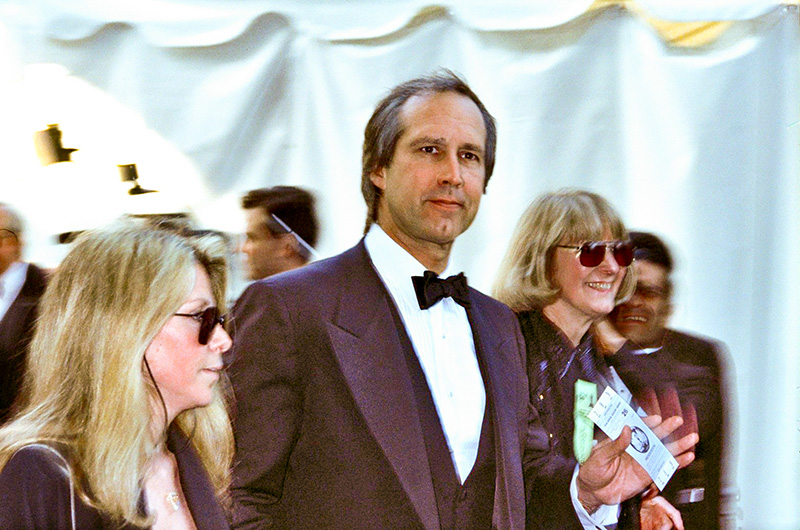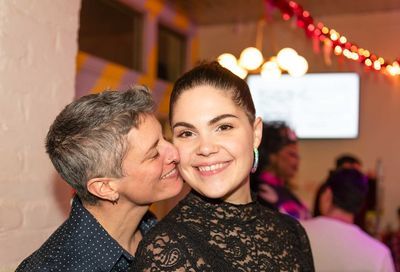How “Transparent” is Transforming Television
Amazon's "Transparent" continues its steady, brilliantly determined march to change the way we experience gender and sexuality

Our Lady J’s life was falling apart.
The classical pianist had a budding, up-and-coming career in the early 2000s. “I was really killing it in the classical world,” she says. “I had been playing Carnegie Hall and killing it.”
Then, in 2005, the Pennsylvania native transitioned.
“Everything dried up really fast,” she says, noting that the transphobia she experienced in the classical world was about as brutal as it comes.
“Watching your career crumble because of choosing to live authentically is pretty soul-shattering. In the classical music world, being perceived as male, someone would listen to me, look me in the eye, take my word for truth. As a trans woman, I would enter a space that I had entered before, and I was constantly questioned, people would stutter when they’d see me, they didn’t know what I was. It wasn’t like there was this personal hatred of trans women, it was just a systemic lack of knowledge around who trans people were. People didn’t understand who I was. They thought I was doing a drag show.”
Our Lady J moved to L.A. to give pop music a try, and found “it was a little more accepting, but there still was a lack of understanding about who trans people were.” Eventually, the work, and the promising musical career, evaporated.
“I faced poverty,” she says, somberly. “I was at my wit’s end. I didn’t know what else to do.”

Enter Jill Soloway, a filmmaker who was having a career high with Transparent, which, in 2014, helped launch Amazon Prime Video, putting it soundly and respectably on a newly emerging TV landscape.
“Jill asked if I’d be interested in writing a short story, a kind of audition,” recalls Our Lady J. “I wrote one overnight, and Jill then asked me to take part in a workshop on screenwriting. In that week-long workshop we made a pilot. A couple weeks later Jill asked me if I would join the writing staff at Transparent.”
To say Our Lady J was overjoyed is an understatement.
“I knew it was my trans-ness that people were having a hard time with in the music industry,” she says. “I heard people tell me flat out that trans women weren’t going to sell albums. So it was a relief that someone in Hollywood was willing to see beyond this systemic transphobia and give me an opportunity to be an artist again.”
It revived Our Lady J’s life, ushering in a new career. And it gave a show that, at its core, dealt frankly and genuinely with trans issues, its first trans voice in the writer’s room.

The groundbreaking series unveiled its fourth season last week, furthering the story of the Pfefferman clan, whose patriarch in season one revealed to a divorced wife and trio of self-absorbed adult children that he was transitioning, that he would now be Maura. Jeffrey Tambor, a familiar face from such seminal comedies as Arrested Development and The Larry Sanders Show, turned the role into something rare, something legend. His performance — profoundly honest, uncomfortably awkward, and always deeply poignant — garnered him a slew of awards, including two Emmys.
“Jill Soloway gave me the role of a lifetime,” Tambor told Metro Weekly last fall, after the debut of season three. “A character like Maura changes you, I think, for the better…. [Playing her has] made me a better person. I think it’s made me more present, certainly more aware. I think it’s made me a better daddy, a better husband, and ultimately, I hope, a better citizen. It certainly has made me an ally.”

Maura is the centerpiece of Transparent, but the show fully deals with the lives of all the Pfeffermans — mother Shelly and offspring Sarah, Josh, and Ali — as well as those drawn into their orbit, sometimes fleetingly, sometimes with a lasting permanence, as it is in life. The show defies tradition in the way it tells its story — unlike many series, it’s not cliffhanger driven, and straddles drama and comedy with equal measure. It is grounded in an uncanny, palpable authenticity.
“We don’t really think of it like a traditional show,” says creator Soloway. “I don’t even think of myself as writing it. It feels a little bit more like a documentary about the Pfeffermans. How could that be when they’re characters? But they really feel like they come equipped with full souls, and these souls chose these actors to play them. Maura was like, ‘I’ll take Jeffrey, please.’ And Ali was like, ‘Give me Gaby Hoffmann.’ Like they existed already before I got to them. They feel very real, so we don’t impose too much on them. We try to listen to them between seasons. We use our unconscious, and we hear them when we’re dreaming or driving or showering. They just kind of tell us what they want and we stick with it.”

The show is loosely based on Soloway’s own experiences with a parent who, in later life, transitioned. In the three years since Transparent‘s launch, Soloway has had epiphanies surrounding sexuality and gender, and has entered into a relationship with poet Eileen Myles, as well as publicly identifying as nonbinary.
“It is a privilege for me to be able to take the nonbinary identity, and wear it,” says the 51-year-old Chicago native. “It feels like a really kind of wonderful, safe, at home place to be that describes a feeling that I’ve had my whole life, where I’ve never really felt like what is meant by the word ‘woman.’ That also doesn’t mean that I want to be under the description of what is meant by the word ‘man.’
“I started to get to know so many nonbinary people — younger people, people who work on our crew — and saw that there is this third option, and slowly and surely over the years tried on this question of ‘Is this who I am?’ Having a trans parent means that I can even lean into that legacy, and say, ‘Hey, maybe it even runs in my family.’ That’s more of an honor, a privilege, a becoming, a feeling of being able to walk through the world in a way that feels like home, and also do something that can personally allow me to be part of the revolution.”

Season four of Transparent doesn’t get political — at least not in the way you’d expect it to. Whereas other current shows have used the election of Donald Trump as a narrative springboard, Transparent keeps its story arcs centered on relationships. Over the course of the series, all of the Pfeffermans have dealt with growth — and unsavory skeletons — in ways that feel genuine and human. In the new season, a trip to Israel presents Maura with an unexpected surprise that rattles her foundations. Even more urgently, it sparks a flame in youngest daughter Ali (the magnificent Gaby Hoffmann), as she takes an eye-opening journey into the Palestinian territory of Ramallah.
The show has never been shy about its uber-Jewish point of view. Nor has it been circumspect about looking at various sides of society’s most complex puzzles. And while Ali’s gravitation toward radicalization feels organic, it leads to a deeper posit about gender norms that has elegantly threaded its way through the series as a whole: what if gender dysphoria is genetically predisposed?
“There are some trans people who can openly say ‘From the moment I was born, I knew I was in the wrong body,'” says Soloway. “But that narrative is very problematic. It’s a narrative that was created by a cis medical system where cis doctors wanted proof that they could succeed medically at transforming and, quote unquote, correct a problem due to a feeling of dysphoria.
“I think genders are great,” Soloway continues. “I think people can have genders. I think there are a lot of people who are really masculine, and there are a lot of people who are really feminine, and some people like the word man, and some people like the work woman. But the genders need have nothing to do with the body, so somebody can be really feminine and that should not mean that you would expect to have a vagina. Somebody can be really masculine and that should not mean that you would expect them to have a penis. Those are totally fine categories: highly masculine, highly feminine. The only thing that matters to me is that people understand there are many places in between that are neither really, really feminine or really, really masculine, and those identities have nothing to do with people’s bodies. I’m not trying to get rid of gender. I’m just trying to add some space in between.”
“For me it’s less about gender and more about God,” says Hoffmann. “It’s about spirituality and a oneness and a unity and a boundaryless-ness that can give Ali access to an understanding of God. The trip to Israel/Palestine is really an activation for Ali. She becomes pretty excited by this group of international activists, social justice workers, and warriors. They’re the first people Ali encounters who are really turned on by something outside of themselves, who have committed themselves to a service that is beyond themselves. And they understand that in doing so, they are serving themselves. Because we’re all connected. And that’s where we leave Ali, with this notion spinning. She’s searching for God, and is left with herself at the end of the season.”
Critics have complained that the show’s primary characters are by and large unlikeable, an attitude that Soloway dismisses as misogynistic.

“I see a lot of misogyny in those comments,” they say. “People don’t really say that about Tony Soprano or Walter White or any number of the unlikable men who are all over television and have been all over television forever. I think people are uncomfortable getting out of their binaries, and most people’s binaries are that the straight, white, American, hetero, powerful man as the narrator, as the subject, and he gets to stand there and point, and give people names: “Woman. Queer. Black. Ugly. Beautiful.” All of these things are usually handed to white men to describe. They’re occasionally handed to women to describe, but because people have been so used to seeing white men in the role of the subject, they’ve been able to go, ‘Okay, now we can have an unlikable hero. We can have Tony Soprano. We can have Walter White. We can have these schlubby guys who are the leads. We can have Larry David, who’s unlikable. We can have Jerry Seinfeld, Woody Allen.’ I mean I could go on and on and on naming unlikable male protagonists who people somehow find lovable. But what is likable? What does that mean? I don’t even know what that means.
“Most of the protagonists on are show are women — Sarah, Ali, Maura, Shelly,” Soloway continues. “And that’s something people haven’t really seen before. It’s like maybe people just aren’t used to seeing women as full people. They aren’t used to seeing queer people as the subject. They aren’t used to being ‘otherized.’ They’re used to being able to point their fingers and say, ‘Well, that woman doesn’t behave the way I want a woman to behave.’ But people who are saying that are actually sort of really responding to this heteronormative structure, whether or not they know it. They’re used to seeing women compete for male attention. Those are the kinds of storylines straight people find compelling. A handsome man who’s a hero and beautiful women competing for his affections. We upend all of that. We just topple every aspect of centering cis heteronormative protagonism, and we want to hand the subjectivity to women, to queer people, to trans people, and that does feel uncomfortable.”
Except that the show is not uncomfortable at all. It’s human. It’s bracing. It’s real. It reflects the worst and the best of us. Moreover, it attempts to balance cultural spirituality — mainly from a Jewish perspective — with an often frank, uncompromising take on sexual activity. Nowhere is this more apparent than in the newest season, in which Sarah reconciles for sexual purposes with her hangdog of a husband, Len. As the season progresses, the couple embark on an erotically charged three-way relationship with a much younger woman, magnificently and alluringly portrayed by Alia Shawkat.

Amy Landecker and Rob Huebel, who portray Sarah and Len, laugh when it’s mentioned that their sex scenes are surprisingly explicit.
“I just want to point out something that you might not notice,” says Landecker. “Rob and I are never naked. Only Alia. He has his underwear on. I have a slip on, I have a bra on. He doesn’t french me. I don’t actually directly touch anyone else’s boobs. It’s illusion, you know? It’s incredible. That’s a lot of movie magic going on.”
“I asked to be fully nude, but they wouldn’t let me,” jokes Heubel. “We were going to get in shape, and I promise you next season, we’re gonna get in shape, and we’re gonna be full frontal nudity!”
“I think part of why it feels so erotic and alive and out there is more the situation than what we’re actually, literally doing,” says Landecker.

Nudity has become a calling card for many non-standard broadcast series — hello, Game of Thrones — but Transparent has been relatively discreet when it comes to revealing skin. Yet the new season features a pivotal moment in which the character of Davina, a transgender woman living with HIV, is seen, casually, in a full frontal repost. It’s a significant, defining moment for a show that is attempting to build a cultural and educational bridge to society at large, informing without stooping to gratuitousness.
“I wanted that scene to happen,” says Alexandra Billings, the immensely gifted actress who portrays Davina. “I wanted a 55-year-old trans body, that’s been living with AIDS for a couple of decades, that’s been ravaged by silicone, that is preoperative, to be seen.
“I like my body,” she continues. “It’s taken me a long time to become friends with my shame, but I think I’ve finally done it. I mean, I’m still working on it. A lot of stuff I’m working on. But I try my best to at least get up every day and look at myself in the mirror and be okay with my history. So I wanted it to be seen — and I wanted it to be seen in a way that wasn’t about being sexualized or fetishized. The writers, including Our Lady J and Jill, are the ones that came up with how to present it in a way that humanized Davina, so that there was no shame.
“I want to draw a big, red circle around the fact that it wouldn’t have happened at all had Trace Lysette [the trans actress who portrays Davina’s friend Shea] not said to me, ‘We need to go in and talk to these writers about our lives and share ourselves.’ It also wouldn’t have happened had Jill not created a set where I feel safe and taken care of and held on to. It would not have happened had I not been surrounded by writers who received me in a way that it was about compassion and history and the ability to tell a story grounded in truth, but also propelled by faith.”

While all of the characters in season four are awarded expanded storylines, one of the most notable is that of Shelly Pfefferman. The role is a career zenith for Judith Light who came to fame in the boilerplate sitcom Who’s the Boss? but later proved that she had the kind of remarkable and rare acting chops possessed by very few others. Light, a friend to the LGBTQ community throughout her career, takes the thankless role of Shelly — the quintessential put-upon, neurotic, cloying, and annoying Jewish mother — and, in the latest season, works a miracle by changing the way the entire family views her and cares for her, especially her son, Josh.
“This role is the highlight of my career,” glows Light. “It’s the advocacy that I have been a part of for so long combined with my artistic work. Jeffrey [Tambor] and I talk about this all the time — the levels of responsibility that we feel we have and now, in particular, to the transgender community. It’s a gift. It’s really profound.”
Light feels that Transparent slowly but surely is making a difference in general public attitudes toward the transgender community — a community that, with the advent of the Trump administration, has seen harsh, hostile setbacks after thrilling progress under President Obama.
“Jeffrey said something that I think is really important,” says Light. “He said, ‘What precedes hatred is ignorance.’ I believe what we do on the show is actually educating people without being didactic or preachy. It shows the stories of human beings relating to this issue. I think that education helps dispel the ignorance and, that, in time, helps to dispel the hatred…. People are waking up. Things like people speaking up, speaking out, coming out, and having shows like Transparent to talk about gender fluidity — it’s here and here to stay. That’s what this is. But, again, it’s just like when we were talking about HIV and AIDS at the height of the pandemic. When people come out about who they are, we’re able to see it, talk about it, engage in conversation, educate, elevate, illuminate, and really move ourselves as a society beyond the things that we are fighting about. Enlightenment means bringing something to the light. That’s what this conversation is about.”

Whatever else it does, Transparent looks at gender fluidity through a sharply-focused cultural lens. It brings ideas to the fore, encapsulating them in a framework that is dramatic, funny, and, frequently, emotionally messy. Each episode imparts a lesson without pounding the viewer with a sledgehammer. The series as a whole has an almost effortless lightness of being, it’s grounded in reality and yet it reaches for — and achieves — something more. And it clarifies, perhaps better than any other current TV drama, where we are headed as a society.
“We go into those kinds of boundary crossing dramatic conflicts with open eyes and strong hearts, our shoulders back, heads held high,” says Soloway, “hoping that this conversation that gets started by art can help transform opinions, and move culture, and create culture, and move society and policy just as it did with trans issues. I think a lot of people feel that Transparent and the way it normalized a trans family and centered trans-ness and queer-ness, helped people understand the absurdity of the bathroom bills or any kind of anti-trans law. Even though we’ve gone backwards a little bit recently, I think a lot of the progress is undeniable.”
“I go to work and I see how these policies and these laws are actually affecting people that I now know and love,” says Huebel. “Before I didn’t have that. It was hard to connect those dots. But now I can see every day, ‘Oh, shit, what I just saw this morning on the news is gonna really fuck up this person’s world today. Now this person’s gonna be more afraid to walk down the street today because of this president.’ So it’s made things very, very real for me and allowed me to love all of these people that I work with.”
Alexandra Billings takes a harder, more cynical line with regard to culture being changed by art.
“Art is a reflection of life — and I would disagree that television changes the culture,” she says. “I don’t think that’s true at all…. If television is changing the face of our culture, we’re in big trouble, for Christ’s sake. The revolution doesn’t come from imaginationland — imaginationland comes from the revolution.
“What we have to remember is that art is queer,” she concludes. “It belongs to the LGBTQIA community. It always has and it always will. We are the foundation of every artistic expression worldwide. That’s been true since the beginning of time. We’ve got to take a stand, my friend. If we don’t do that as queer people, art is going to dissipate and shrivel and die, and then we’ll have no voice whatsoever.”
All four seasons of Transparent are available for streaming exclusively on Amazon Prime Video.
Support Metro Weekly’s Journalism
These are challenging times for news organizations. And yet it’s crucial we stay active and provide vital resources and information to both our local readers and the world. So won’t you please take a moment and consider supporting Metro Weekly with a membership? For as little as $5 a month, you can help ensure Metro Weekly magazine and MetroWeekly.com remain free, viable resources as we provide the best, most diverse, culturally-resonant LGBTQ coverage in both the D.C. region and around the world. Memberships come with exclusive perks and discounts, your own personal digital delivery of each week’s magazine (and an archive), access to our Member's Lounge when it launches this fall, and exclusive members-only items like Metro Weekly Membership Mugs and Tote Bags! Check out all our membership levels here and please join us today!




























You must be logged in to post a comment.